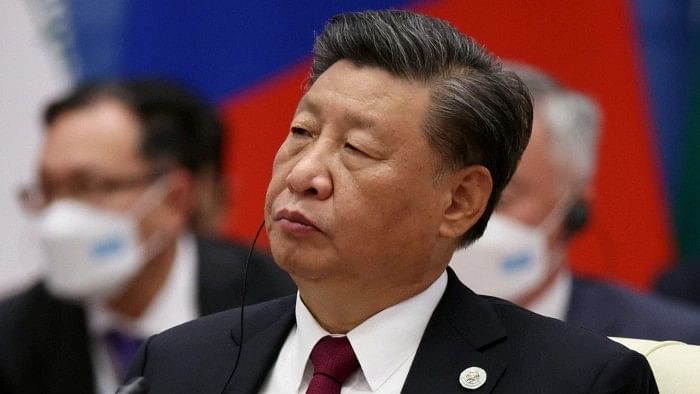
Chinese President Xi Jinping will give the 18th G20 summit in New Delhi a miss.
Credit: Reuters File Photo
The G20 should rise up to deal with the challenges being faced by the global economy, Beijing said on Monday, officially confirming that President Xi Jinping would give the intergovernmental forum’s forthcoming 18th summit in New Delhi a miss and that Premier Li Qiang will lead the delegation from China.
The Ministry of Foreign Affairs of the Chinese government in Beijing issued a press release, stating that the communist country’s president would skip the G20 summit, which is being projected by New Delhi as a reflection of India's growing international reputation and influence. The brief statement confirmed the speculation that Li, instead of Xi, would attend the summit.
Beijing noted that the world economy is experiencing increasing downward pressure and the challenges for global sustainable development are immense. “It is important that the G20, being the premier forum for international economic cooperation, strengthen partnership and rise up to the big challenges facing global economy and development so as to contribute to world economic recovery and growth and global sustainable development,” Mao Ning, a spokesperson for the Chinese government, said in Beijing.
“We hope the New Delhi summit will form consensus on that, send out a message of confidence, and promote shared prosperity and development,” she added while replying to a query from a journalist.
China’s call for the G20 to deal with the challenges faced by the global economy reflects the stand it has taken in the negotiation over the “Delhi Declaration” - proposed to be adopted at the end of the summit. Though the West, led by the United States, has been insisting on the inclusion of a condemnation of Russia’s military aggression against Ukraine, Beijing and Moscow have been opposing the same, arguing that the G20 was a forum meant to promote international economic cooperation and not to discuss geopolitical issues.
Beijing downgraded its participation in the G20 summit in New Delhi amid a continuing stand-off between the Chinese People’s Liberation Army and the Indian Army along the disputed boundary between the two nations in eastern Ladakh.
New Delhi, however, is not seeing the development as a snub by Beijing, with sources saying that the G20 has not had a single occasion since 2010 when every member country attended the annual summit at the level of leadership.
Russian President Vladimir Putin will also skip the G20 summit, to be held at the newly inaugurated Bharat Mandapam in New Delhi on Saturday and Sunday. Putin’s Foreign Minister Sergey Lavrov will lead the delegation from Moscow. President Andrés Manuel López Obrador of Mexico will also give the summit a miss.
The presence of Xi and Prime Minister Narendra Modi at the recent BRICS summit held in Johannesburg in South Africa was seen as an opportunity for New Delhi and Beijing to work out a roadmap for the mutual withdrawal of troops from the remaining face-off points along the Line of Actual Control (LAC) in eastern Ladakh. New Delhi was hoping for a thaw in its strained relations with Beijing in order to avoid the awkward spectacle of Modi hosting Xi when the soldiers of the two nations were still engaged in a stand-off in the Himalayas.
The two leaders did have a conversation in Johannesburg. New Delhi claimed that they had agreed to direct relevant officials to step up efforts for expeditious disengagement of frontline troops from the remaining face-off points along the LAC. Beijing also issued a statement, quoting Xi telling Modi that China and India should bear in mind the overall interests of their bilateral relations and handle properly the border issue, so as to jointly safeguard peace and tranquillity in the region. The statement issued by China, however, had refrained from referring to the leaders of both countries agreeing to expedite the complete resolution of the dispute.
Beijing also recently issued a new map showing India’s Arunachal Pradesh and Aksai Chin as part of Chinese territory. After New Delhi lodged a strong protest, the Chinese government stated that its move to issue the map was an “exercise of sovereignty”.
